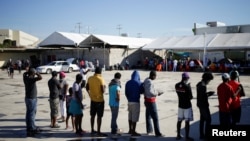Several U.N. agencies are calling on countries in the Americas to stop “expelling” Haitians without first assessing their “protection needs” and to uphold the “fundamental human rights of Haitians on the move.”
The U.N. Refugee Agency (UNHCR), the International Organization for Migration (IOM), the United Nations Children’s Fund (UNICEF) and the U.N. Human Rights Office (OHCHR) say Haitians also need better access to “regular migration pathways.”
The U.N. agencies say countries in the Americas need a “regional approach” to deal with the migrants.
The Washington Post reports many Haitians say “restrictive” immigration policies in several Latin American countries where they’ve lived for years, in combination with U.S. President Joe Biden’s more open immigration policies, sparked a recent northward move to the American border.
Thousands of Haitians have been living in Chile, Brazil and other countries since the devastating 2010 earthquake in Haiti that killed over 200,000 people.
Many Haitians in Chile had legal refugee status there.
Recently, more than 14,000 Haitians lived in squalid conditions for days at the U.S.-Mexico border near the Texas city of Del Rio. More are reportedly on the way to the border.
Most of the Haitians who were backed up at the U.S.-Mexico were eventually allowed into the U.S., but nearly 4,000 were sent back to Haiti.
Earlier this week, the Biden administration acknowledged it sent $5.5 million to Haiti to help support asylum-seekers deported from Del Rio, but it rejected reports it had "paid" Haiti to take back the rejected migrants.





